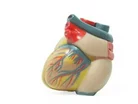New nasal spray 'vaccine' could prevent heart attacks

A team of scientists from a university in Switzerland have successfully developed a vaccine which is able to prevent heart attacks.
Studies have revealed that the breakthrough vaccine, which can be administered via an injection or nasal spray, stops fat from building up in the arteries, a condition known as atherosclerosis.
It is thought to be the first drug of its kind – one that aims to target the underlying cause of heart disease and heart attacks.
There are now hopes the vaccine could be made widely available within the next five years.
To read the latest edition of Healthcare Global, click here
- Viaspan organ fluid recalled amid contamination fears
- First volume of cancer encyclopedia is published
- World’s largest cleft lip research project is launched
According the Daily Telegraph newspaper, early stage animal tests found the drug was able to reduce the build up of fat in the arteries by 60 to 70 percent.
It works by encouraging the body’s immune system to produce antibodies which can fight this build up and prevent it from occurring.
As a result, less strain is placed on the heart as it is able to pump blood through arteries and around the body more easily.
Commenting on the new vaccine, the Medical Director of the British Heart Foundation, Professor Peter Weissberg, said: “A vaccination approach to the treatment of atherosclerosis is based on an attempt to interfere with the cellular mechanisms that cause life threatening build up of fatty deposits.
“There will be great interest in the outcome of the on-going studies to see firstly if this approach is safe and secondly, whether it can influence the progression of vascular disease in the long term.”
He added: “It is very promising, but it will take some time before we know if it is successful and, if so, which patients are likely to benefit most from this treatment.”
Professor Jan Nilsson from Lund University explained that if the drug makes it to market, only those at a high-risk of heart attacks would benefit.
“The antibody therapy in particularly is likely to be expensive, so you could probably only afford to give it to high-risk populations rather than everyone,” he was quoted as saying in the Daily Telegraph.
“People at high risk of heart attacks are likely to be the first candidates for immune approaches.
“Such treatments, since they’ve totally different modes of action, could be used in addition to the current therapies,” he added.
The Healthcare Global magazine is now available on the iPad. Click here to download it.
- Movianto’s Active Frozen Transport for Vaccine CampaignsMedical Devices & Pharma
- GSK’s Arexvy vaccine protects elderly from hospitalisationHospitals
- Hepatitis outbreak renews calls for access to vaccinesMedical Devices & Pharma
- Global effort can end pandemic in 2022 - WHOTeleHealth & COVID-19



